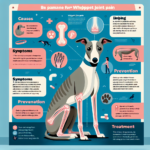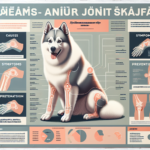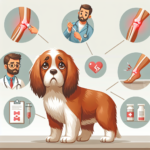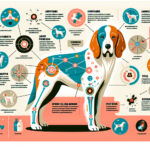Whippet Joint Pain: Causes, Symptoms, Prevention, and Treatment

Introduction
The Whippet, a breed known for its sleek appearance and incredible speed, has a rich history dating back to the 19th century in England. Originally bred for hunting small game and later for racing, Whippets are characterized by their slender bodies, deep chests, and long legs. They are often referred to as “the poor man’s racehorse” due to their agility and speed. Whippets are affectionate, gentle, and make excellent companions, but like all breeds, they have their own set of health concerns.
Among the various health issues that Whippets may face, joint pain is a significant concern. Joint health is crucial for Whippets, given their active lifestyle and physical demands. Understanding the causes, symptoms, prevention, and treatment of joint pain in Whippets can help owners ensure their pets lead a healthy and comfortable life.
Breed-Specific Joint Pain Risks
Genetic Predisposition
Whippets, like many other breeds, can be genetically predisposed to joint-related issues. Conditions such as hip dysplasia, arthritis, and elbow dysplasia are not uncommon. Hip dysplasia, in particular, is a hereditary condition where the hip joint does not fit properly into the hip socket, leading to pain and mobility issues. Arthritis, a degenerative joint disease, can also affect Whippets, causing inflammation and pain in the joints.
Age-Related Risks
As Whippets age, the risk of developing joint pain increases. While younger Whippets may not show signs of joint issues, older dogs are more susceptible to conditions like arthritis. Typically, joint pain may start to manifest in Whippets around the age of 6-8 years, although this can vary depending on the individual dog’s health and lifestyle.
Activity Level and Joint Stress
Whippets are known for their high energy levels and love for running. While regular exercise is essential for their overall health, excessive or high-impact activities can put stress on their joints. Activities such as racing, agility training, or even frequent jumping can contribute to joint wear and tear over time. It’s important for owners to balance their Whippet’s activity level to prevent undue stress on their joints.
Common Symptoms of Joint Pain in Whippets
General Symptoms
- Limping: One of the most noticeable signs of joint pain is limping or favoring one leg over the other.
- Stiffness: Stiffness, especially after rest or sleep, can indicate joint pain.
- Reluctance to Move: A Whippet that is hesitant to run, jump, or climb stairs may be experiencing joint discomfort.
- Swelling: Swelling around the joints can be a sign of inflammation and pain.
- Behavioral Changes: Changes in behavior, such as irritability or decreased interest in play, can also be indicative of joint pain.
Breed-Specific Symptoms
In Whippets, joint pain may manifest in specific ways due to their unique build and activity levels. For instance, you might notice a Whippet having difficulty getting up from a lying position or showing a decreased interest in running, which is unusual for this active breed. Additionally, Whippets may exhibit a more pronounced limp due to their slender legs and lightweight frame.
When to Consult a Vet
If you observe any of the above symptoms in your Whippet, it’s essential to consult a veterinarian promptly. Early diagnosis and intervention can significantly improve the quality of life for a dog suffering from joint pain. A vet can perform a thorough examination, including X-rays or other imaging tests, to determine the underlying cause of the joint pain and recommend appropriate treatment.
Preventive Measures for Joint Health
Exercise Recommendations
Regular, moderate exercise is crucial for maintaining joint health in Whippets. Activities such as walking, swimming, and controlled running can help keep their joints flexible and muscles strong without causing excessive stress. Avoid high-impact activities like jumping or abrupt changes in direction, which can strain the joints. It’s also beneficial to provide a mix of physical and mental stimulation to keep your Whippet engaged and healthy.
Dietary Suggestions
A balanced diet rich in essential nutrients can support joint health in Whippets. Consider incorporating foods or supplements that contain glucosamine, chondroitin, and omega-3 fatty acids, which are known to promote joint health and reduce inflammation. High-quality commercial dog foods often include these nutrients, but you can also consult your vet for specific dietary recommendations tailored to your Whippet’s needs.
Weight Management
Maintaining a healthy weight is vital for reducing joint stress in Whippets. Excess weight can exacerbate joint pain and lead to other health issues. Monitor your Whippet’s weight regularly and adjust their diet and exercise routine as needed to keep them at an optimal weight. Your vet can provide guidance on the ideal weight range for your Whippet based on their age, size, and activity level.
Early Screening and Monitoring
Early screening and regular monitoring can help detect joint issues before they become severe. Regular veterinary check-ups, including orthopedic evaluations, can identify early signs of joint problems. For Whippets with a known genetic predisposition to joint issues, consider more frequent screenings and proactive measures to manage their joint health.
Treatment Options for Joint Pain
Non-Surgical Treatments
Non-surgical treatments for joint pain in Whippets include medications, physical therapy, and lifestyle adjustments. Anti-inflammatory medications and pain relievers can help manage pain and reduce inflammation. Physical therapy, including exercises and stretches, can improve joint mobility and strength. Additionally, lifestyle adjustments such as providing a comfortable resting area and avoiding high-impact activities can alleviate joint stress.
Surgical Options
In severe cases of joint pain, surgical intervention may be necessary. Common surgical options for joint issues in Whippets include hip replacement, arthroscopy, and joint fusion. These procedures can provide significant relief and improve mobility, but they also come with risks and require a thorough evaluation by a veterinary surgeon. Post-surgical care and rehabilitation are crucial for a successful recovery.
Alternative Therapies
Alternative therapies such as acupuncture, hydrotherapy, and massage can also benefit Whippets with joint pain. Acupuncture can help reduce pain and inflammation, while hydrotherapy provides low-impact exercise that supports joint health. Massage therapy can improve circulation and relieve muscle tension around the joints. These therapies can be used in conjunction with traditional treatments for a comprehensive approach to managing joint pain.
Lifestyle and Management Tips
Daily Care Routine
A consistent daily care routine can help manage and alleviate joint pain in Whippets. This routine might include gentle exercises, regular grooming to check for any signs of discomfort, and administering any prescribed medications or supplements. Providing a warm and comfortable resting area can also help ease joint pain.
Modifying the Home Environment
Making adjustments to your home environment can significantly improve the comfort of a Whippet suffering from joint pain. Consider using ramps instead of stairs, providing orthopedic beds for better support, and ensuring that food and water bowls are at an accessible height. These modifications can reduce strain on the joints and make daily activities easier for your Whippet.
Long-Term Management
Long-term management of joint pain involves a combination of regular veterinary care, appropriate exercise, a balanced diet, and a supportive home environment. Consistent monitoring and adjustments to your Whippet’s care routine can help manage their condition and maintain their quality of life. It’s also important to stay informed about new treatments and therapies that may benefit your Whippet.
FAQs About Whippets and Joint Pain
What are the early signs of joint pain in Whippets?
Early signs of joint pain in Whippets include limping, stiffness, reluctance to move, and behavioral changes such as irritability or decreased interest in play. If you notice any of these symptoms, consult your veterinarian for a thorough evaluation.
Can joint pain in Whippets be prevented?
While it may not be possible to completely prevent joint pain, taking preventive measures such as regular exercise, a balanced diet, weight management, and early screening can significantly reduce the risk and severity of joint issues in Whippets.
Are there specific exercises that are better for Whippets with joint pain?
Low-impact exercises such as walking, swimming, and controlled running are ideal for Whippets with joint pain. These activities help maintain joint flexibility and muscle strength without causing excessive stress on the joints.
What dietary supplements can help with joint health in Whippets?
Supplements containing glucosamine, chondroitin, and omega-3 fatty acids are beneficial for joint health. These nutrients support cartilage health, reduce inflammation, and improve joint function. Consult your vet for specific supplement recommendations for your Whippet.
When should I consider surgical options for my Whippet’s joint pain?
Surgical options should be considered when non-surgical treatments are no longer effective in managing your Whippet’s joint pain. Severe cases of hip dysplasia, arthritis, or other joint issues may require surgical intervention. A veterinary surgeon can evaluate your Whippet’s condition and recommend the best course of action.
Conclusion
Joint pain is a significant concern for Whippets, given their active lifestyle and genetic predisposition to certain joint issues. By understanding the causes, symptoms, prevention, and treatment options for joint pain, owners can take proactive steps to ensure their Whippets lead healthy and comfortable lives. Regular veterinary care, appropriate exercise, a balanced diet, and a supportive home environment are key to maintaining joint health in Whippets. By staying informed and vigilant, you can help your Whippet enjoy a happy and active life despite the challenges of joint pain.




